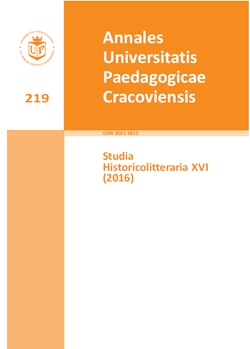Ważki i Zagłada
Main Article Content
Abstrakt
Dragonflies and Holocaust
The dragonflies occupy a special place in Jerzy Ficowski’s poetic universe. The Holocaust occupies a special place in his poetic reflection. These two dominant factors were not put together so far, but they should be after multiple readings and analyzes of the works of the author of Reading of the Ashes [Odczytanie popiołów], but also due to the new trends in the study of the history of the Holocaust. My hypothesis is, that Jerzy Ficowski has written organic history of the Holocaust long before it was taught and practiced by the Holocaust specialists. As a literary scholar, poet’s interpreter, I tried to thoroughly analyze the poems, and inform about these precursory poetic notes of the author. This anticipation is significant and perceived in the collective imaginarium. The dragonflies have been living in the world for 325 million years (they are the world’s oldest insects), humans - also the creators of Extermination and experiencing the Holocaust - initiated their own species history less than 10 million years ago.
Key words: Jerzy Ficowski; dragonfly; Jewish Holocaust; Polish poetry; interspecies sensitivity;
Downloads
Article Details

Utwór dostępny jest na licencji Creative Commons Uznanie autorstwa – Użycie niekomercyjne – Bez utworów zależnych 4.0 Międzynarodowe.
POLITYKA PRAW AUTORSKICH
Wydawca „Annales Universitatis Paedagogicae Cracoviensis. Studia Historicolitteraria” jest upoważniony do korzystania oraz do rozpowszechniana wszystkich opublikowanych w czasopiśmie materiałów na podstawie umowy licencji niewyłącznej, zawartej uprzednio na czas nieoznaczony każdorazowo z autorem/ką konkretnego utworu na określonych w tamtejszej umowie polach eksploatacji.
POLITYKA OTWARTEGO DOSTĘPU
„Annales Universitatis Paedagogicae Cracoviensis. Studia Historicolitteraria” to czasopismo o otwartym dostępie, a cała jego zawartość jest dostępna bezpłatnie dla użytkowników i instytucji na zasadach licencji niewyłącznej CreativeCommons (CC BY-NC-ND 4.0). Użytkownicy/ki mogą czytać, pobierać, wykonywać kopie, rozpowszechniać, drukować, wyszukiwać lub linkować do pełnych tekstów artykułów w tym czasopiśmie bez uprzedniej zgody wydawcy lub autora/ki pod warunkiem podania źródła dostępu i autorstwa danej publikacji. Jest to zgodne z definicją otwartego dostępu BOAI (http://www.soros.org/openaccess).
Bibliografia
Bakke M., Bio-transfiguracje. Sztuka i estetyka posthumanizmu, Poznań 2010.
Baron M., Grzebanie Grzebania. Archeolog i grabarz w twórczości Jerzego Ficowskiego, Katowice 2014.
Czwordon P., Empatia i obserwacja. O poezji Jerzego Ficowskiego, Poznań 2010.
Ekier J., Posłowie, (do:) J. Ficowski, Gorączka rzeczy, Warszawa 2002.
Kobielska M., Nastrajanie pamięci. Artykulacja doświadczenia w poezji Jerzego Ficowskiego, Kraków 2010.
Korczak J., Pamiętniki i inne pisma z getta, Warszawa 2012.
Kuczyńska-Koschany K., „Exodus 1947”. Zapomniany wiersz Jerzego Ficowskiego o żydowskim statku pijanym, „Polonistyka” 2014, nr 11.
Miłosz Cz., Zaraz po wojnie. Korespondencja z pisarzami 1945–1950, Kraków 2007.
Segev T., Siódmy milion. Izrael – piętno Zagłady, przeł. B. Gadomska, Warszawa 2012.
Teoria wiedzy o przeszłości na tle współczesnej humanistyki. Antologia, red. E. Domańska, Poznań 2010.
Ubertowska A., Natura u kresu (ekocyd), „Teksty Drugie” 2013, nr 1–2.
